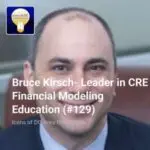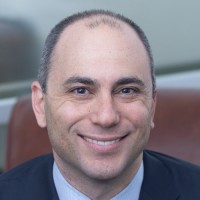

Bio
As the founder of Real Estate Financial Modeling (REFM), Bruce Kirsch has trained thousands of students and professionals around the world in Excel-based projection analysis. In addition, REFM’s self-study products, Excel-based templates and its Valuate® property valuation and investment analysis software are used by more than 100,000 professionals. Mr. Kirsch’s firm has assisted with modeling for the raising of billions of dollars of equity and debt for individual property acquisitions and developments, as well as for major mixed-use projects and private equity funds. Mr. Kirsch has also maintained a blog on real estate financial modeling, Model for Success, authoring more than 500 posts, and he is the co-author of Real Estate Finance and Investments: Risks and Opportunities, along with Dr. Peter Linneman.
Mr. Kirsch began his real estate career at CB Richard Ellis, where he marketed highrise New York City office buildings for re-development in the Midtown Manhattan Investment Properties Institutional Group. After CBRE, Mr. Kirsch was recruited to lead acquisitions at Metropolis Development Company, and later joined The Clarett Group, a programmatic development partner of Prudential.
While at The Clarett Group, Mr. Kirsch was responsible for making development site recommendations for office, condominium and multi-family properties in the greater Washington, D.C. metropolitan area. In addition, Mr. Kirsch had significant day-to-day project management responsibilities for the entitlement, financing and marketing of the company’s existing D.C.-area development portfolio.
Mr. Kirsch holds an MBA in Real Estate from The Wharton School of the University of Pennsylvania, where he was awarded the Benjamin Franklin Kahn/Washington Real Estate Investment Trust Award for academic excellence. Prior to Wharton, Mr. Kirsch performed quantitative equity research on the technology sector at The Capital Group Companies. Mr. Kirsch served as an Adjunct Faculty member in real estate finance at Georgetown University School of Continuing Studies. Mr. Kirsch graduated with a BA in Communication from Stanford University.
Show Notes
Introduction and Podcast Format
- Introduction of Bruce Kirsch and the podcast format, including a traditional interview followed by a case study and discussion of AI tools. (2:40)
Bruce Kirsch and REFM
- Bruce Kirsch’s current role as the founder of REFM (Real Estate Financial Modeling), his 17-year career helping others with financial modeling in Excel, and his various activities including consulting, training, coaching, and creating tools (5:45)
Early Life and Career Path
- Bruce Kirsch’s upbringing on Long Island and early influences from his father (a civil engineer) and mother (an interior designer), as well as his childhood fascination with the Manhattan skyline (8:30)
- Bruce Kirsch’s pursuit of a BA in Communication from Stanford University, his interest in visual arts and filmmaking, and his experience in the photography darkroom (12:50)
- The unexpected connection between his Stanford communication background and his current work in financial modeling, particularly in storytelling and visual communication (13:30)
- His experience taking a gap year between high school and college (14:45)
- His reasons for choosing Stanford, including the campus and the network (15:15)
- His career trajectory after Stanford: working in Hollywood and then in the mutual fund business (21:00)
- His experience during the tech bust while working in equity research (25:45)
- His decision to pursue an MBA at Wharton to gain a business education and his eventual focus on real estate after walks through Philadelphia (27:30)
- His relationship with Peter Linneman at Wharton and taking his real estate finance and investments course (29:05)
- His experience working for a developer in Washington DC during the red-hot condominium market of 2003 at Metropolis Development Company (30:50)
- Experiencing the downturn in the real estate market around 2007-2009 and being laid off (33:00)
- The role of desperation as a motivator in starting his business (35:00)
Financial Modeling Principles
- Discussion on the role of projections in real estate investment decisions despite their inherent uncertainty, using the analogy of a flight plan (39:20)
- Acknowledging that financial analyses rarely align perfectly with actual outcomes and questioning if Bruce has ever had a proforma come true (40:30)
- Addressing the impact of externalities like inflation, the S&L crisis, 9/11, the Global Financial Crisis, and COVID-19 on real estate projections (41:30)
- Strategies for compensating for unpredictable events and the importance of stress testing models and having a cushion (45:00)
- The difficulty of modeling black swan events (48:00)
- Advice for individuals aspiring to enter the field of real estate financial modeling (50:40)
- What excites Bruce Kirsch about financial analysis and the importance of understanding the real estate business and transaction mechanics (52:00)
- His collaboration with Peter Linneman on the textbook “Real Estate Finance and Investments”, which began through his teaching at Georgetown (53:00)
- “Valuate” software derivation (56:00)
- Bruce Kirsch’s observations over the past 17 years, emphasizing the balance between precision and practicality in financial modeling (58:40)
- Growth is painful (59:00)
- Company as small as it has been…just him now (1:01:00)
- Advice is to learn from mistakes and maintain humility (1:03:30)
- Spreadsheet starts out blank and is a tool. Always increase knowledge of real estate business and ask why conventions like “waterfalls” are there. (1:07:45)
AI in Real Estate
- Demonstration of Bruce Kirsch’s analytical model and discussion of AI tools he has experimented with, highlighting challenges with trustworthiness and current limitations (he shares a multifamily acquisition model online) (1:10:00)
- Discussion on prompting AI and its effectiveness in refining assumptions. AI is “oversold” as a reliable tool currently. (1:12:15)
- Bruce Kirsch’s dream scenario for AI’s application in his work, such as auditing spreadsheets and automating grunt work (1:14:30)
- Discussion about the potential for custom AI models tailored to specific expertise (1:20:00)
- The importance of data quality and internal data troves for effective AI implementation (1:27:30)
- Dream scenario for Bruce is AI doing an audit on spreadsheets and reporting back the errors from inspection (1:29:00)
- Insights from Bruce’s former interns on the most painful day-to-day tasks they’d like to offload to AI, such as pulling comps and market data (1:33:00)
- Exploring the potential of AI in collaborating on deal analysis and generating different scenarios for complex situations like restructurings and adaptive reuse (1:36:00)
- Analogy of AI tools to the Bloomberg terminal (1:38:50)
- Comparison of the current state of AI to the early days of the internet (1:39:30)
- Discussion about Khan Academy‘s AI tool, Khanmigo, and its domain-specific training for education. Salman Khan’s book is “Brave New Words” (1:40:30)
- Experiences of an Iconic Journey in CRE member (Chris Caylor) with ChatGPT and Otter.ai for automation and note-taking (1:43:00)
- Hypothetical case study on how AI could assist in multifamily deal analysis (1:47:20)
- Concerns about the potential for AI to homogenize deal underwriting (1:48:45)
- The role of AI in standardizing data formats and creating more digestible reports (1:49:45)
- Bruce Kirsch’s agreement on the potential of AI to improve clarity and liquidity in the real estate market (1:51:15)
REFM Opportunities
- Bruce discusses the services (REFI) format (see below for course information and a discount) (1:53:00)
- He built the model for The Wharf DC, a 2+ million s.f. mixed use project (110 tabs) (1:56:00)
- Questionnaire about mixed use properties (1:58:00)
Personal Reflections and Industry Perspective
- Bruce Kirsch’s overall perspective on the real estate industry, highlighting it as a tremendous and multidisciplinary opportunity and the paramount importance of reputation and trust (2:00:30)
- Bruce Kirsch’s message if he could put a sign on the Capitol Beltway: “Don’t take yourself too seriously” (2:04:30)
Courses
Bruce is offering his courses at a discount to podcast listeners. First, take a free assessment at this link: https://courses.getrefm.com/shop/free-tools/free-assessment-tests/. When you’ve determined your level, go to this website: https://courses.getrefm.com/ and use the discount code “Iconic” at the checkout to get a 15% discount for the course.
